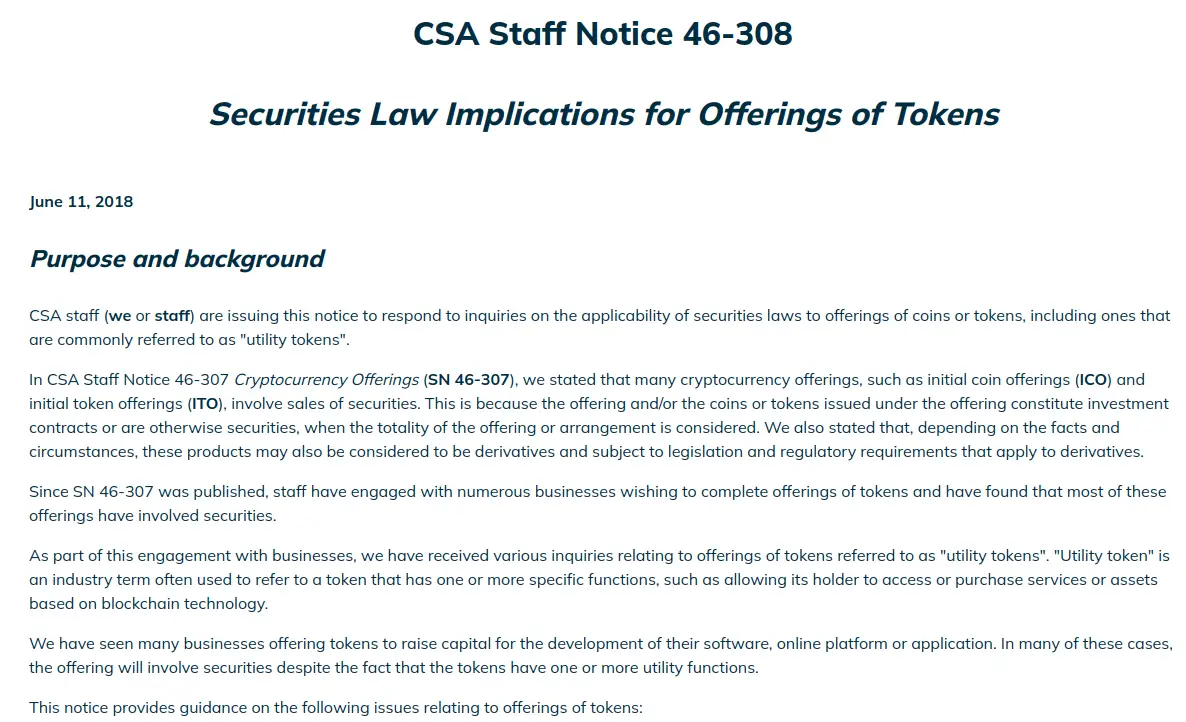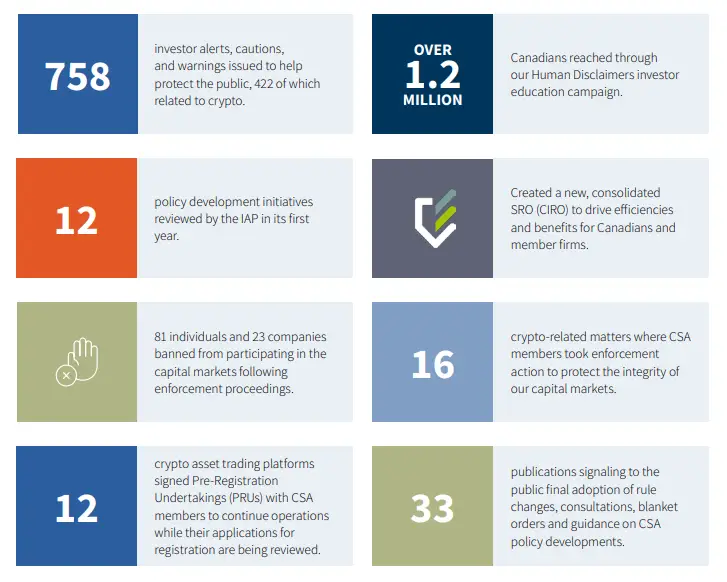In 2014, Mt. Gox, the largest bitcoin exchange at the time, collapsed. It left thousands of investors and the broader financial community in shock, bringing a sharp turn to the conversation around crypto regulations.
The event didn't just highlight the volatile nature of digital currencies. It also underscored the urgent need for a regulatory framework protecting investors from similar fates.
In the wake of this turmoil, Canadian regulators, spearheaded by the Financial Transactions and Reports Analysis Centre of Canada (FINTRAC), embarked on a proactive journey to ensure that businesses dealing in cryptocurrencies operated within a legal framework. Hence, the interests of investors and the integrity of the financial system were conserved.

As we stand in 2024, it's clear that the Canadian approach to crypto regulations has evolved significantly. Unlike the reactive stances seen in other jurisdictions, Canada has sought to embrace the complexities of digital currencies, crafting a regulatory environment that balances innovation with investor protection.
This nuanced approach has not only provided clarity to businesses and investors alike but also positioned Canada as one of the leaders in the global conversation on cryptocurrency regulations.
At Global Blockchain Solution, today we will delve into the intricacies of Canada's regulatory stance on cryptocurrencies, how it evolved over the years, and where it's at. In this post, there will be a lot of insights worth their weight in gold for businesses. So, hold on tight!
This Article Contains:
The Evolution of Cryptocurrency Regulation in Canada
The story of crypto regulations in Canada, like other nations, is a complex tapestry woven from legislative actions, regulatory responses, and pivotal moments that have shaped the current landscape.
For the uninitiated, the Canadian regulatory landscape is characterized by its collaborative nature, involving multiple regulatory bodies including the Canadian Securities Administrators (CSA) and provincial securities commissions like Quebec's Autorité des marchés financiers (AMF) and the Ontario Securities Commission (OSC).

This collaborative effort aims to harmonize the regulatory framework across the country. It has also nurtured the crypto landscape with a coherent and comprehensive legal structure.
1. The Genesis: Post-Mt. Gox Regulatory Awakening
The collapse of Mt. Gox in 2014 prompted regulatory bodies worldwide to reconsider the oversight of cryptocurrencies. In Canada, this event underscored the urgent need for a regulatory framework that could safeguard investors and maintain the integrity of the financial system.
The aftermath of Mt. Gox propelled Canadian regulators to take proactive steps, leading to the enactment of Bill C-31, which expanded the scope of the Proceeds of Crime (Money Laundering) and Terrorist Financing Act (PCMLTFA) to include virtual currency dealers as money service businesses (MSBs).
2. A Framework in Flux: The CSA's Evolving Guidance
In the heady days of 2017, the crypto craze was in full swing. Businesses rushed to cash in on the ICO and ITO gold rush, with little heed to regulations. But the party couldn't last forever.
The Canadian Securities Administrators (CSA) emerged as the sheriffs of the crypto space, determined to rein in lawlessness. Their first shot across the bow came with Staff Notice 46-307 in August 2017, warning that ICO offerings would face scrutiny under securities laws.
Also Read: IPO vs. ICO vs. IEO vs. STO: What's the difference?
This notice threw cold water on the unbridled exuberance, making it clear there would be consequences for ignoring crypto regulations. The CSA's stance foreshadowed crackdowns by the SEC, such as the Kik case in 2019, which brought an abrupt end to the ICO heyday.
But the CSA didn't stop there. In June 2018, Staff Notice 46-308 peered behind the "utility token" label, providing a framework to unmask securities masquerading as utilities. This was a major blow to creative corporate structuring designed to avoid crypto regulations. The CSA was wise to their games.

And, as we would later find out, the regulators were just getting warmed up. It issued the Joint CSA/IIROC Consultation Paper 21-402 paper in March 2019, while seeking industry consultation, tackled the risks of crypto trading platforms head-on, putting the players on notice to prepare for stricter oversight.
Stakeholders awaited anxiously as the CSA honed its aim. Staff Notice 21-327 in January 2020 outlined securities legislation applicable to crypto trading entities, sending a clear message: comply with crypto regulations or face consequences.
The CSA's shot hit the target in March 2021. While upholding investor protections, its Staff Notice 21-329 was released, delineating clear pathways for businesses seeking to offer crypto assets. For innovators willing to play by the rules, the door was open.
Years passed, and the guidance kept evolving as the crypto market matured. Staff Notice 21-333 in October 2023 expanded the interim approach for Fiat-Backed Crypto Assets (FBCA), underscoring accountability through requirements like appointing an agent for service in Canada.
Earlier that year, Staff Notice 81-336 also offered guidance on crypto asset investment funds, highlighting expectations around custody, liquidity, and due diligence.
The CSA was staying agile and attentive amidst crypto's rapid changes. Its evolving guidance shaped the regulatory landscape. Its steady hand ensured that the crypto wild west gave way to a maturing market governed by thoughtful securities laws.
Innovation could thrive, but not without accountability. The sheriffs had restored order to the town.
Also Read: What is Consensus Mechanism in Blockchain? 25 Consensus Mechanisms to Choose From
3. Other Key Developments
Multiple events such as Mt. Gox, QuadrigaCX, and FTX collapse have called for the need for stricter crypto regulations time and again.
In this regard, since the beginning, CSA guidelines offered significant clarity. But regulations were also required for other aspects of crypto businesses.

So, while the CSA tackled securities regulations, crypto businesses also had to traverse a complex maze of tax, reporting, and compliance obligations. The Canada Revenue Agency (CRA) lay in wait for those trying to avoid taxes on capital gains or business income from crypto activities.
Also Read: SEC vs. Ripple: What, When, & How
Since the early Wild West days, the CRA had made it clear: crypto transactions were subject to tax just like fiat currency – though as a barter transaction. Businesses had to closely track and record every sale, exchange, and mining activity or risk being rounded up for tax evasion.
The CRA kept pace with the evolving industry, ensuring emerging activities like ICOs, DeFi protocols, and NFT markets were lassoed into the tax regime. Detailed record-keeping became essential to calculate capital gains accurately and demonstrate good faith efforts at compliance.
And it wasn't just the CRA on patrol - FINTRAC emerged as a sheriff determined to curb money laundering and terrorist financing. Crypto businesses had to register as MSBs and implement strict AML and CTF programs tailored to digital assets, including reporting transactions above $10,000.
Together, these regulators formed a daunting gauntlet of rules. But law-abiding players put in the work: they built robust systems to track transactions, calculated and remitted taxes properly, and developed adequate AML/CTF controls.
The few outlaws who tried to find loopholes or flout crypto regulations were chased down by the determined sheriffs and brought to justice. While the rules have continued to evolve, legitimate crypto businesses adapted to the regime. Overall, the system brought order and security to the industry on behalf of all Canadians.
What Should Resident and Non-Resident Canadian Businesses Keep in Mind?
Non-compliance is a risky bet for any serious business as regulators like CSA have actively played their roles as vanguards. CSA alone has taken enforcement actions in 23 crypto-related matters between July 2022 and June 2023, permanently banning 16 businesses in the country.

So, it's mandatory to ensure relevant compliance for smoother operations. Here are some of the aspects that crypto businesses in Canada should keep in mind:
1. Anti-Money Laundering (AML) and Counter-Terrorist Financing (CTF) Compliance
Under the Proceeds of Crime (Money Laundering) and Terrorist Financing Act (PCMLTFA), crypto businesses are considered Money Services Businesses (MSBs) and must comply with AML and CTF regulations.
This includes implementing a compliance program, keeping records, and reporting large transactions and suspicious activities to FINTRAC.
Crypto businesses should conduct regular risk assessments to understand their exposure to money laundering and terrorist financing risks and tailor their compliance programs accordingly. Implementing robust customer due diligence processes is crucial for identifying and mitigating potential risks.
2. Securities Law Compliance
If a crypto business offers products or services that are considered securities or derivatives, they must comply with securities laws. This may involve registering with provincial securities regulators or obtaining exemptions. The Canadian Securities Administrators (CSA) has issued several staff notices clarifying the application of securities laws to crypto assets.
Engage with legal counsel early to determine if your crypto assets are considered securities and understand the registration or exemption requirements. Transparency with investors and regulators about the nature of the crypto assets and the risks involved is also key.
For instance, the Ontario Securities Commission (OSC) has registered several crypto asset trading platforms, such as Bitbuy and Coinsquare, under specific terms and conditions to enhance investor protection.
3. Consumer Protection
Crypto businesses must ensure transparency and fairness in their dealings with consumers. This includes providing clear information about the services offered, the risks involved, and adhering to privacy laws.
Developing clear terms of service and privacy policies that are easily accessible to consumers can help. Additionally, implementing robust security measures to protect consumer data and promptly addressing consumer complaints is essential.
For instance, the Financial Consumer Agency of Canada (FCAC) expects entities offering crypto-assets to notify the agency and provide any relevant information, allowing the FCAC to assess market conduct obligations.
4. Operational Requirements
There are expectations for crypto businesses to have measures in place to safeguard the assets they hold. This includes both digital currencies and customer funds.
Implementing multi-signature wallets, cold storage solutions, and regular security audits can help in safeguarding assets. Establishing clear procedures for fund recovery in case of lost keys is also advisable.
5. Privacy and Data Security
Crypto businesses must also comply with Canada's privacy laws, including the Personal Information Protection and Electronic Documents Act (PIPEDA), which governs how businesses must handle personal information.
Implementing strong encryption for data storage, conducting regular privacy impact assessments, and training employees on data protection are key strategies.
Here effective strategies like two-factor authentication (2FA) and end-to-end encryption for user communications can improve privacy and data security.
6. Business Continuity and Disaster Recovery
While specific laws may not dictate business continuity plans, it's a best practice for crypto businesses to have robust risk management processes, including plans for business continuity and disaster recovery.
Developing and regularly testing a comprehensive business continuity plan that includes scenarios like cyber attacks, data breaches, and physical disasters is crucial.
For instance, the proactive approach of Canadian crypto businesses in conducting disaster recovery drills and having backup systems in place serves as a model for operational resilience.
7. Registration with Provincial Regulators
Depending on the province, crypto businesses may need to comply with additional provincial regulations and register with provincial regulators like the OSC or Québec's Autorité des marchés financiers (AMF).

Engage with provincial regulators to understand specific requirements and seek legal advice on compliance matters as applicable.
8. International Compliance
Crypto businesses operating internationally must comply with the crypto regulations of those jurisdictions, in addition to Canadian laws.
For instance, in the U.S., crypto businesses must navigate a complex regulatory environment where both federal and state governments have a say.
At the federal level, agencies like the Securities and Exchange Commission (SEC), the Commodity Futures Trading Commission (CFTC), the Federal Trade Commission (FTC), and the Department of the Treasury, through the Internal Revenue Service (IRS) and the Financial Crimes Enforcement Network (FinCEN), are involved in regulating various aspects of cryptocurrency activities.
Also Read: The Legality of Launching an ICO in the US
The SEC, for example, has been particularly active in asserting that many tokens may be considered securities and thus subject to federal securities laws.
State-level regulations can vary significantly, with some states promoting blockchain technology through favorable regulations, while others amending their money transmitter laws to include cryptocurrencies, thereby increasing regulatory requirements for crypto businesses.
These detailed requirements and best practices underscore the multifaceted regulatory landscape that crypto businesses in Canada must navigate to ensure compliance and protect the interests of their customers and the integrity of the financial system.
If you need any help or have any queries, feel free to get in touch with Global Blockchain Solution representatives. Our experienced legal professionals, auditors, and crypto marketers can ensure your crypto project is destined for success.
Contact us today or get on a free, no-string-attached 15-minute consultation with our representatives.
Frequently Asked Questions
1. Is cryptocurrency regulated in Canada?
Yes, cryptocurrency is regulated in Canada. The main regulators are the Canadian Securities Administrators (CSA), the Canada Revenue Agency (CRA), the Financial Transactions and Reports Analysis Centre of Canada (FINTRAC), and provincial securities regulators. The regulations cover areas like securities, taxation, anti-money laundering, consumer protection, and more.
2. Is crypto regulated by Fintrac?
Yes, FINTRAC regulates cryptocurrency businesses for anti-money laundering and counter-terrorist financing purposes. Under the Proceeds of Crime (Money Laundering) and Terrorist Financing Act (PCMLTFA), cryptocurrency dealers are considered money services businesses (MSBs) and must comply with FINTRAC regulations around implementing a compliance program, record keeping, reporting large transactions, etc.
However, depending on the nature of the business, the purview of CSA, CRA, etc. may also apply.
3. Is crypto business legal in Canada?
Yes, cryptocurrency businesses are legal in Canada if they comply with relevant regulations. This includes securities laws, AML/CTF requirements, tax laws, privacy laws, consumer protection laws, etc. at both federal and provincial levels. By registering with regulators where required and implementing proper compliance programs, cryptocurrency businesses can legally operate in Canada.
4. How do I start a crypto business in Canada?
Here are some steps to start a crypto business in Canada:
Determine if your crypto assets are securities and if securities laws apply. Seek legal advice.
Register with FINTRAC as an MSB and implement a robust AML/CTF compliance program.
Consult with the CRA on tax obligations related to crypto transactions and income.
Register with provincial regulators like the OSC if required.
Implement strong privacy and security controls to protect consumer data.
Have a business continuity and disaster recovery plan.
Ensure transparency with consumers about services, risks, etc.
Seek legal counsel to ensure compliance with evolving regulations.
You can also work with a firm like Global Blockchain Solution to handle compliance, legal, marketing, and other aspects of starting your Canadian crypto business. Their team of experts can guide you through the complex regulatory landscape.




